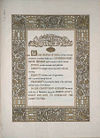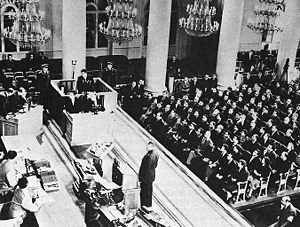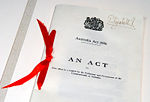Portal:Law
2008/9 Schools Wikipedia Selection. Related subjects: Law; Portals
Law is a social institution, which has been defined as a "system of rules", as an "interpretive concept" to achieve justice, as an "authority" to mediate people's interests, and even as "the command of a sovereign, backed by the threat of a sanction". "The rule of law," wrote the philosopher Aristotle in 350 BCE, "is better than the rule of any individual." The study of law raises important questions about equality, fairness and justice. This is not always simple. "In its majestic equality," wrote the author Anatole France in 1894, "the law forbids rich and poor alike to sleep under bridges, beg in the streets and steal a loaf of bread." Every legal system elaborates legal rights and responsibilities in different ways. Most countries have codified system of civil law which is regularly updated by governments. Many others use common law which develops through judicial precedent. Small numbers of countries still base their law in religious texts. But in all places there is a rich history to law, with deep philosophical ideas underpinning it. Law raises pressing economic issues, just as intense political battles are fought to mould law throughout its institutions. Professionals are usually trained to give people advice about their legal rights and duties and represent them in court. But despite the complexity, law is a highly rewarding study.
The Fundamental Rights, Directive Principles of State Policy and Fundamental Duties are sections of the Constitution of India that prescribe the fundamental obligations of the State to its citizens and the duties of the citizens to the State. These sections comprise a constitutional bill of rights and guidelines for government policy-making and the behaviour and conduct of citizens. These sections are considered vital elements of the constitution, which was developed between 1947 and 1949 by the Constituent Assembly of India.
The Fundamental Rights are defined as the basic human rights of all citizens. These rights, defined in Part III of the Constitution, apply irrespective of race, place of birth, religion, caste, creed or gender. They are enforceable by the courts, subject to specific restrictions.
The Directive Principles of State Policy are guidelines for the framing of laws by the government. These provisions—set out in Part IV of the Constitution—are not enforceable by the courts, but the principles on which they are based are fundamental guidelines for governance that the State is expected to apply in framing and passing laws.(more...)
Dietrich v. The Queen was an important case decided in the High Court of Australia on 13 November 1992. It concerned the nature of the right to a fair trial, and under what circumstances indigent defendants (defendants who cannot afford legal representation) should be provided with legal aid by the state. The case determined that although there is no absolute right to have publicly funded counsel, in most circumstances a judge should grant any request for an adjournment or stay when an accused is unrepresented. It is an important case in Australian criminal law, and also in Australian constitutional law, since it is one of a number of cases in which some members of the High Court have found implied human rights in the Australian Constitution.
Alfred Thompson 'Wesley' Denning, Baron Denning, OM, PC ( 23 January 1899 – 5 March 1999) was an English jurist, judge and barrister from Hampshire, who became a Law Lord and Master of the Rolls (the senior civil judge in the Court of Appeal of England and Wales). Lord Denning was a judge for 38 years before retiring at the age of 83 in 1982. Over the course of his long career, he became renowned for the wit and commanding prose of his judgements as well as for the intellectual persuasiveness of his legal reasoning. A passionate reformer from the outset of his career, Lord Denning fathered many important concepts which would become pillars of the common law (such as promissory estoppel) and many more which would ultimately be rejected in the House of Lords (such as the doctrine of fundamental breach). (more...)
The Australia Act 1986 is an act of the Parliament of Australia (No. 142 of 1985) and the Parliament of the United Kingdom (c.2 1986) which eliminated the remaining ties between the legislature and judiciary of Australia and their counterparts in the United Kingdom. In particular, the act resolved the anomalous power of the United Kingdom's parliament to legislate over the individual Australian states, a power that it had exercised since colonial times and which had not been affected by the 1931 Statute of Westminster. (more...)



